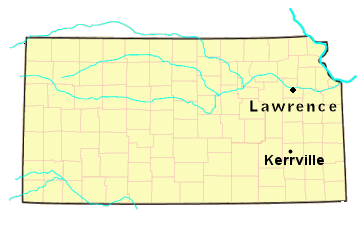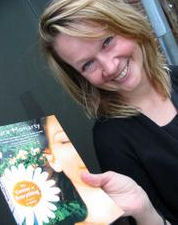| 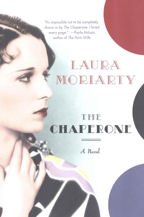
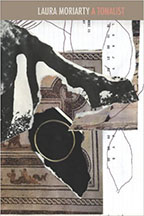
.jpg)
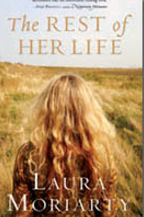
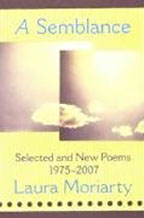
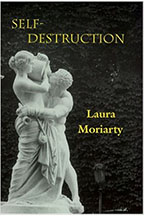
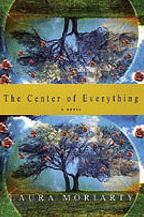
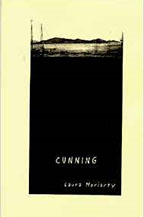
|
|
Biography |
|
| |
Laura Moriarty received her Bachelor of Social Work and Master of Arts in English from the University of Kansas. She was awarded the George Bennett Fellowship for Creative Writing at Phillips Exeter Academy. Her first novel, the Center of Everything, was published in 2003 by Hyperion. She lives in Lawrence and teaches Creative Writing at the University of Kansas. Her second novel, The Rest of Her Life, was published by Hyperion in 2007, and her third, While I'm Falling came out in 2009.
Return to Top of Page |
|
|
Bibliography ( - housed in Thomas Fox Averill Kansas Studies Collection) - housed in Thomas Fox Averill Kansas Studies Collection) |
|
| |
Return to Top of Page
|
|
|
| Reviews |
|
| |
"I just couldn't put it down; it read as easily as Steinbeck and I believe, could without contest, replace classic reading material for high-schools. It's more up to date and relevant to today than say, literary classics such as The Catcher in the Rye, or Of Mice and Men. Graceful storytelling, touching material and a good message that you don't need to railroad your life, that you can escape the machinations and traps set out before you, that you can soar above your troubles and succeed."
---From a review by David Desjardins. For more go to Blogcritics Magazine.
"The title of Laura Moriarty's impressive debut novel THE CENTER OF EVERYTHING refers to the story's Kansas setting: "If you look at a map of the world, the United States is usually right in the middle, and Kansas is in the middle of that. So right here where we are, maybe this very stretch of highway we are driving on, is the exact center of the whole world, what everything else spirals out from." The title, however, could just as easily apply to its young narrator, Evelyn. So often, Evelyn is the calm heart at the center of the crazy events swirling around her, quietly observing and commenting on everything that happens but rarely sucked into these everyday dramas."
---From a review by Norah Piehl. For more of this review, go to bookreporter.com.
"This impressive debut is a marvelously satisfying story."
---Christina Schwarz, author of Drowning Ruth
"Deadpan and dead-on, this funny, moving portrait of unready adolescence reads like To Kill a Mockingbird updated for our time."
---Mark costello, author of Big If
Return to Top of Page |
|
|
| Author Interview* |
|
| |
When did you begin writing? When did you begin to take yourself seriously as a writer?
I wrote short stories when I was a kid, but in high school I decided I wanted to do something practical, something more useful to the world. In college, I majored in social work and took pre-med courses. I thought Doctors Without Borders was the coolest thing you could do, and I still think that. But I finally gave in and realized that I had to write. I'm very fortunate, given the way things have turned out. But sometimes I see doctors do their thing, helping to ease suffering in such a tangible way, and I have to sigh and wish I had their skills.
What do you feel your greatest inspirations have been in your years of writing?
Before I published, I was often inspired when I went to readings. There was something so encouraging about seeing the real person, a living, normal human being, behind the 'famous' name or amazing prose. I went to go see Christina Schwarz read part of her first novel, Drowning Ruth. I was so impressed by what she'd accomplished that I stayed up very late that same night working. I thought, 'she (Christina Schwarz) wrote all that down so beautifully and made the story work. Maybe I can too.'
How has living in Kansas influenced your work?
I love the landscape here. I think both the geography and the people here are more complex than people in other places realize, and I hope my work reflects that.
Who are some of the authors/poets that you most admire?
Jane Hamilton, Carl Sagan, Margaret Atwood, Jonathan Franzen, Barbara Kingsolver, Tobias Wolff, Tom Wolfe
When you sit down to write a novel do you usually know how you would like it to come out, or does the creative process lead you to something completely unexpected?
I do have an outline, some idea, but I'm always open to change and detours. My wonderful writing teacher Carolyn Doty used to say, 'the worst thing you can do to your characters is force them to stick to your plans.'
You mentioned a struggle between your desire to write and the desire to choose a path with more apparent ‘practical’ application when you were receiving your education. How did you resolve that conflict?
Do you have any advice for others who are struggling with the same problem?
It just got to the point where I couldn't focus on anything else - I couldn't care enough about any other job or field of study to make it a career that I would pursue with passion. I'm not sure you can be good at something if you don't have a passion for it. You can only fake it for so long. I was a mediocre pre-med student. I was a mediocre social worker. I would do my best, and then come home at night exhausted, but not so exhausted that I didn't stay up too late writing stories. I realized I was putting much more creativity and care into my stories than into my social work jobs. I also knew I was better at it - I felt much more competent at the keyboard than I did at my desk at the shelter. I still admire teachers and doctors and social workers so much - teachers, in fact, show up often in my stories. I find it ironic that I get more praise and money now as a writer than I did when I was a social worker. I worked so much harder when I was a social worker. Social work is a hard career, and it requires more intelligence and empathy than writing does, and in social work, you usually don't get the chance to go back and edit whatever you did. The fact that some people can stay in it and fight the good fight year after year amazes me.
How has the experience of writing The Rest of Her Life differed from writing The Center of Everything?
I was a more pragmatic this time. I had a little more experience under my belt, and I so I knew I would save time if I thought the plot and characters and conflicts out before I started writing. With the first novel, I would just write and rewrite and rewrite and rewrite. I wrote ten novels that got whittled down to one. I had more of a map with the second novel; I wanted to know where I was going. This is my day job now. I can't afford to take too many wrong turns.
What’s next?
I'm outlining the next book right now. That's the hardest part, I think - shaping an idea into something that will actually work as a novel.
*Miranda Ericsson interviewed Laura Moriarty via Email-- April, 2007
Return to Top of Page |
|
| Writing Samples |
| |
"What about your mom?"
He makes a face. "The Wizard of Oz is on. She'll be camped out all night."
I smile. My mother is also watching it, lying on the couch underneath the quilt Eileen gave her for Christmas. She tried to get me to watch it with her, but I'm sick of it. It's on every year, and I've seen it so many times that I can say the lines right along with the movie, from "Auntie Em, Auntie Em" to "I'll get you, my little pretty," down the yellow brick road and back again to the scary flying monkeys who turn out to be people and then back off to see the Wizard who is really just an old man who is very nice but not exactly dependable to "You had the answer inside you all the time, Dorothy, just click your heels three times." My mother said, "Okay, Evelyn, you've seen it before. I get the picture."
She said she knew all the lines by heart too, but she still wanted to watch it. She pulled the quilt up to her eyes, but when Dorothy started to sing "Somewhere Over the Rainbow," she knew I could see she was crying, and she said it was just because she liked the song.
---from page 70 in The Center of Everything
I look out my window, down at the yellow lines whizzing under us in the middle of the highway. There is nothing but fields of wheat on each side of the road, their feathery tops swirling in the heat. Last year, Ms. Fairchild read some of My Antonia to us. She said she wanted us to see Kansas and Nebraska the way it is in the book, beautiful, a breadbasket that feeds so many people. She said Kansas is beautiful if you look at it the right way, and that we shouldn't believe anything other people try to say about it. The abundance of it, she said, spreading her arms in her Wednesday dress, as if she were holding on to something large.
I like living in Kansas, not just because of the wheat, but because it's right in the center. If you look at a map of the world, the United States is usually right in the middle, and Kansas is in the middle of that. So right here where we are, maybe this very stretch of highway we are driving on, is the exact center of the whole world, what everything else spirals out from.
---from page 85 of The Center of Everything
Return to Top of Page |
|
|
| |
Links |
|
|
| |
Laura Moriarty online with Miranda Ericsson, of Topeka & Shawnee County Public Library
Laura Moriarty interview with Miranda Ericsson
An interview with Moriarty on the KU Women of Distinction web site
An article about Linda Moriarty on Lawrence.com by Richard Gintowt
An article about Laura Moriarty’s support of a KU scholarship
An interview with Laura Moriarty about While I'm Falling
A review from Powell's books of Laura Moriarty's book While I'm Falling
Wikipedia page of Laura Moriarty
Laura Moriarty's webpage
Q&A with Laura Moriarty at Powell's Books
Return to Top of Page
This site was constructed by Miranda Ericsson, 2007
Last updated in October, 2016 |
|
|
|

